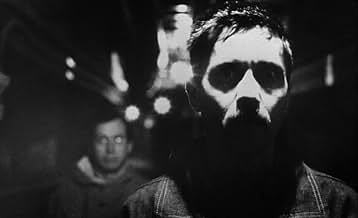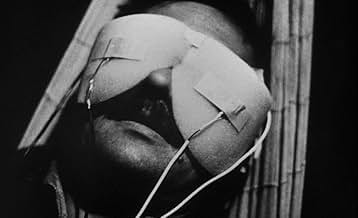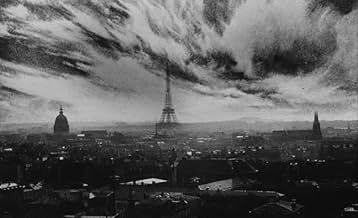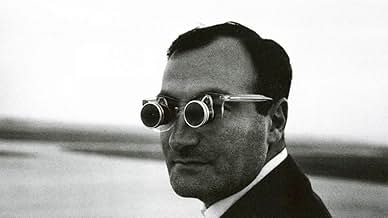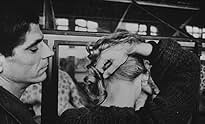CALIFICACIÓN DE IMDb
8.2/10
39 k
TU CALIFICACIÓN
En medio de la devastación por la Tercera Guerra Mundial, un hombre es obligado a explorar sus recuerdos.En medio de la devastación por la Tercera Guerra Mundial, un hombre es obligado a explorar sus recuerdos.En medio de la devastación por la Tercera Guerra Mundial, un hombre es obligado a explorar sus recuerdos.
- Dirección
- Guionista
- Elenco
- Premios
- 2 premios ganados en total
Jean Négroni
- Narrator
- (voz)
- (as Jean Negroni)
Ligia Branice
- A woman from the future
- (as Ligia Borowcyk)
William Klein
- A man from the future
- (as Bill Klein)
James Kirk
- Narrator
- (English version)
- (voz)
- Dirección
- Guionista
- Todo el elenco y el equipo
- Producción, taquilla y más en IMDbPro
Opiniones destacadas
10myphx
The first time I saw this movie it was on a local educational TV channel (PBS was barely starting) in 1969. I was a youngster and it made such an indelible impression that I remembered it all these years. Luckily, to my surprise I discovered a copy recently at a video rental store.
The movie is only approximately 30 minutes in length and is composed of black and white still photography (except for one scene, where they show a mans eye blinking). It is a powerful depiction of the end of the world, human love and memory. The French narration adds to the poetic subtlety and drama. To my dismay, I heard there was a new DVD version available, but with English narration. Hopefully, the original French version will be made available, as it seems to add so much more to the dramatic effect of the movie.
To the average movie viewer, this film would be best described as avant-garde in nature. It is a prime example of how science fiction and drama can be produced with nuance and subtleties, rather than overuse of technological effects and gratuitous titillation and violence.
The movie is only approximately 30 minutes in length and is composed of black and white still photography (except for one scene, where they show a mans eye blinking). It is a powerful depiction of the end of the world, human love and memory. The French narration adds to the poetic subtlety and drama. To my dismay, I heard there was a new DVD version available, but with English narration. Hopefully, the original French version will be made available, as it seems to add so much more to the dramatic effect of the movie.
To the average movie viewer, this film would be best described as avant-garde in nature. It is a prime example of how science fiction and drama can be produced with nuance and subtleties, rather than overuse of technological effects and gratuitous titillation and violence.
"La jetée" is a million years ahead of its time. To make a movie in 1962 about World War III, time traveling and a distant future that is still genuinely disturbing and not in the least outdated comes close to a miracle.
Here's a short synopsis of the story: After World War III Paris is lying in tatters. The earth has been contaminated and survivors of the war have to live underground imprisoned by the victorious nation (it's never said explicitly which nation that is, but they are talking German). Scientists are looking for a way to secure the survival of mankind by exploring the possibilities of time traveling. In the process one of the prisoners, who has a strong connection to the past because of a recurring dream of his childhood, serves as their guinea pig. As the experiments go on the time traveler falls in love with a woman from the past and comes face to face with the childhood memory he's been obsessed with all his life.
The story might have a familiar ring to you. It's basically the same story Terry Gilliam used in "12 Monkeys". But while "12 Monkeys" is a great movie, ultimately it will be "La jetée" that will stand the test of time (no pun intended). Director/screenwriter Chris Marker's approach is amazingly clever and effective. His movie is a sequence of beautiful black and white photographs with somebody narrating the story. The pictures and the perfect music make the whole thing seem like a documentary on World War II and give the movie a disturbingly realistic feel. Marker never makes the mistake to show too much. The destruction of Paris, the experiments and the future are all hinted at rather vaguely in the pictures and in the narration. A lot is left to our imagination and when The Man, as the main character is simply called, drifts through time it almost seems like a feverish dream to the viewer, too. What's more concrete is the relationship of The Man and The Woman and the contrast between the short untroubled moments The Man spends in the past and his enslavement in the present. Marker concentrates on those aspects and almost shrugs the time traveling off as a negligibility and the result is nothing short of amazing.
With its 26 minutes running time "La jetée" accomplishes more than some epic trilogies do. It remains a classy work of art that looks fresher than any other movie from the 60's that I've ever seen and in 50 years from now it will not have lost any of its appeal, either.
Here's a short synopsis of the story: After World War III Paris is lying in tatters. The earth has been contaminated and survivors of the war have to live underground imprisoned by the victorious nation (it's never said explicitly which nation that is, but they are talking German). Scientists are looking for a way to secure the survival of mankind by exploring the possibilities of time traveling. In the process one of the prisoners, who has a strong connection to the past because of a recurring dream of his childhood, serves as their guinea pig. As the experiments go on the time traveler falls in love with a woman from the past and comes face to face with the childhood memory he's been obsessed with all his life.
The story might have a familiar ring to you. It's basically the same story Terry Gilliam used in "12 Monkeys". But while "12 Monkeys" is a great movie, ultimately it will be "La jetée" that will stand the test of time (no pun intended). Director/screenwriter Chris Marker's approach is amazingly clever and effective. His movie is a sequence of beautiful black and white photographs with somebody narrating the story. The pictures and the perfect music make the whole thing seem like a documentary on World War II and give the movie a disturbingly realistic feel. Marker never makes the mistake to show too much. The destruction of Paris, the experiments and the future are all hinted at rather vaguely in the pictures and in the narration. A lot is left to our imagination and when The Man, as the main character is simply called, drifts through time it almost seems like a feverish dream to the viewer, too. What's more concrete is the relationship of The Man and The Woman and the contrast between the short untroubled moments The Man spends in the past and his enslavement in the present. Marker concentrates on those aspects and almost shrugs the time traveling off as a negligibility and the result is nothing short of amazing.
With its 26 minutes running time "La jetée" accomplishes more than some epic trilogies do. It remains a classy work of art that looks fresher than any other movie from the 60's that I've ever seen and in 50 years from now it will not have lost any of its appeal, either.
This is one of the most stunning short films ever made. Marker has pieced together an oblique, sci-fi setting for marvelous still photography; when there is movement, it is a cause for joy! Everyone who is a cineast should see this film: it's that good and it's that important!
10rclusso
I first saw "La Jetee" in an introductory journalism class in the spring of 1973. The class was large, so large, in fact, that it was held in an auditorium rather than a conventional classroom. But when the film ended, there was about 30 seconds of stone-silence before the murmuring began. I sat slack-jawed and stunned and looked at Mary Ann, a girl who sat next to me and who I was slowly becoming friends with, to check her reaction. She looked equally stunned.
Thirty years have passed and I have occasionally revisited that moment. Despite wanting to know Mary Ann better, I was too timid and never saw her again after that semester ended and despite being stunned by the film, for some reason, I had lost track of its title. All I remembered was a haunting scene at an airport with a guy wearing glasses. That was it.
Just the other day and for no reason at all, I remembered the title "La Jetee" out of the blue. The name just popped into my head. And, even stranger, when I was checking the TV listings earlier today, I found that "La Jetee" was being shown on the Sundance Channel later.
I just finished watching it and I am as slack-jawed and stunned as I was thirty years ago. I guess the next logical thing will be to hear from Mary Ann. Just so long as I don't have to meet her at the airport.
Thirty years have passed and I have occasionally revisited that moment. Despite wanting to know Mary Ann better, I was too timid and never saw her again after that semester ended and despite being stunned by the film, for some reason, I had lost track of its title. All I remembered was a haunting scene at an airport with a guy wearing glasses. That was it.
Just the other day and for no reason at all, I remembered the title "La Jetee" out of the blue. The name just popped into my head. And, even stranger, when I was checking the TV listings earlier today, I found that "La Jetee" was being shown on the Sundance Channel later.
I just finished watching it and I am as slack-jawed and stunned as I was thirty years ago. I guess the next logical thing will be to hear from Mary Ann. Just so long as I don't have to meet her at the airport.
I had never seen such an original film that works so well. The artist with no budget decides to make a film that could have appealed to the commercial masses. That is what is scary about it. It's the kind of story that we would consider "blockbuster gold". A journey through time, sci-fi, and romance. And yet, it requires no special effects, it requires no big budget. Marker laughs right at the face of conventional cinema and uses stills to let out imagination read between the lines.
Is this fiction? Yes, to some extent. The post-apocalyptic story that it recounts would make Waterworld blush with embarrassment, true. But once again, the arty film looks at us to find a meaning for the story. At the end of the day, are we more taken aback by the technical aspect in which Marker engages, or by the shocking finale. Would the finale have been so shocking had Marker used a Bolex camera? I fear not. The bit where he's running towards the girl in the end feels like an average nightmare, where you're running, but you can't get to wherever you want to get to. It's a feeling we have all felt, and the lack of movement within the frame conveys a certain feeling of helplessness and entrapment that could only have been achieved this well with stills.
And we must say, these stills are amazing. It's not only the elaborate mise-en-scene, or the design of the sets and the props (the french sci-fi glasses are extraordinary). It's also the placement of the camera, that has a ghostly versatility that often adds to the lack of comfort of the restless characters.
I must also give a shout for the score that is amazing, which is strange if we count that your average experimental film hardly ever employs such "cinematic" scores, always going for the more minimalist (and generally less expansive) ones.
Is this fiction? Yes, to some extent. The post-apocalyptic story that it recounts would make Waterworld blush with embarrassment, true. But once again, the arty film looks at us to find a meaning for the story. At the end of the day, are we more taken aback by the technical aspect in which Marker engages, or by the shocking finale. Would the finale have been so shocking had Marker used a Bolex camera? I fear not. The bit where he's running towards the girl in the end feels like an average nightmare, where you're running, but you can't get to wherever you want to get to. It's a feeling we have all felt, and the lack of movement within the frame conveys a certain feeling of helplessness and entrapment that could only have been achieved this well with stills.
And we must say, these stills are amazing. It's not only the elaborate mise-en-scene, or the design of the sets and the props (the french sci-fi glasses are extraordinary). It's also the placement of the camera, that has a ghostly versatility that often adds to the lack of comfort of the restless characters.
I must also give a shout for the score that is amazing, which is strange if we count that your average experimental film hardly ever employs such "cinematic" scores, always going for the more minimalist (and generally less expansive) ones.
¿Sabías que…?
- TriviaThis short film was the inspiration for the Terry Gilliam film 12 Monos (1995).
- Créditos curiososThe opening credits do not describe it as a film, but as "un photo-roman".
- ConexionesEdited into The Hamster Factor and Other Tales of Twelve Monkeys (1996)
Selecciones populares
Inicia sesión para calificar y agrega a la lista de videos para obtener recomendaciones personalizadas
Detalles
- Tiempo de ejecución28 minutos
- Color
- Mezcla de sonido
- Relación de aspecto
- 1.66 : 1
Contribuir a esta página
Sugiere una edición o agrega el contenido que falta

